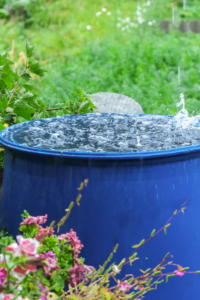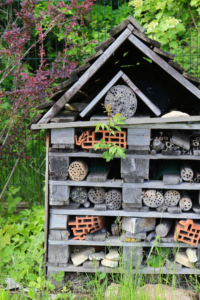Creating a beautiful and sustainable landscape is not only good for the environment but also enhances the value and appeal of your home. Incorporating eco-friendly landscaping can make a significant difference and create an oasis for you and the local wildlife in the process! Here are some practical tips to help you cultivate a greener outdoor space at your Colorado home.
1. Choose Native Plants

The Columbine (Aquilegia), aka granny’s bonnet, is a perennial flower that blooms in the spring. There are more than 70 species of columbines that grow wild in mountain areas, along stream beds, and in temperate woodlands. The columbine is Colorado’s state flower.
Native plants are the cornerstone of an eco-friendly landscape. These plants are adapted to the
local climate and soil conditions, making them more resilient and requiring less maintenance. Because they thrive in the natural environment, native plants need less water, fertilizer, and pesticides. This reduces your environmental footprint and helps maintain local biodiversity.
In Colorado, popular choices include Rocky Mountain Penstemon, Blue Grama Grass, and Colorado Blue Columbine. These plants will not only flourish but also provide habitat and food for local wildlife.
To get started, visit local nurseries or consult with a landscaping expert to find the best native plants for your area. The Colorado Native Plant Society also has an abundance of resources available in identifying area-specific native plants and gardening tips including what plants NOT to include.
2. Implement Xeriscaping
Xeriscaping is a landscaping method specifically designed for water conservation. By using drought-resistant plants and reducing lawn areas, you can significantly cut down on water usage. This is especially important in areas like Boulder, where water resources can be limited.
When planning your xeriscape, consider incorporating elements such as gravel, rocks, and mulch to help retain soil moisture and minimize water evaporation. Group plants with similar water needs together to optimize irrigation. This approach not only conserves water but also creates a low-maintenance, visually appealing garden.
Colorado State University Extension has several fact sheets and tips for implementing xeriscaping at your home.
3. Use Organic Mulch
Organic mulch, such as wood chips, straw, or compost, offers numerous benefits for your garden. It helps retain moisture in the soil, regulates soil temperature, and suppresses weeds. Additionally, as the mulch decomposes, it adds valuable nutrients back into the soil, improving its quality over time.
Apply a thick layer of mulch around your plants and trees, being careful to avoid piling it directly against the stems or trunks to prevent rot. This simple step can make a big difference in maintaining a healthy, thriving garden.

Under Colorado House Bill 16-1005, rain barrels can only be installed at single-family households and multi-family households with four (4) or fewer units. A maximum of two (2) rain barrels can be used at each household and the combined storage of the 2 rain barrels cannot exceed 110 gallons. Rain barrels can only be used to capture rainwater from rooftop downspouts and the captured rainwater must be used on the same property from which the rainwater was captured, for only outdoor purposes.
4. Install a Rainwater Harvesting System
Collecting rainwater is an excellent way to reduce your reliance on municipal water supplies and support your garden sustainably. Rain barrels or more complex systems can capture and store rainwater for later use in irrigation.
To set up a rainwater harvesting system, position your rain barrels under downspouts to catch runoff from your roof. Use screens to keep out debris and insects, and consider connecting a drip irrigation system to the barrels for efficient watering. This method not only conserves water but also provides your plants with naturally soft, chemical-free rainwater.
There are applicable state statutes in Colorado governing water rights – Colorado State University has compiled an excellent fact sheet highlighting how homeowners can remain legally compliant while putting rainwater to use for home irrigation.
5. Create a Compost Pile
Composting is a natural process that recycles organic materials, such as kitchen scraps and yard waste, into nutrient-rich soil. By composting, you reduce the amount of waste sent to landfills and provide your garden with a free, organic fertilizer.
To start a compost pile, include a mix of green (nitrogen-rich) materials, like vegetable scraps and grass clippings, and brown (carbon-rich) materials, like leaves and straw. Turn the pile regularly to aerate it and speed up the decomposition process. Over time, you’ll have rich, dark compost to enrich your garden soil.
6. Opt for Permeable Paving
Traditional concrete and asphalt surfaces can lead to water runoff and erosion. Permeable paving options, such as porous concrete, gravel, or pavers, allow water to soak into the ground, reducing runoff and recharging groundwater.
Use permeable materials for driveways, walkways, and patios to create an environmentally friendly and aesthetically pleasing landscape. These materials not only help manage stormwater but also reduce the urban heat island effect by allowing water to cool the surface.

Bug hotels are a great way to attract beneficial insects to your Colorado garden. Incorporating different materials and levels provides shelter and nesting sites for native and migratory solitary insects.
7. Support Local Wildlife
Creating a habitat for local wildlife not only enhances biodiversity but also helps control pests naturally. Include a variety of plants that provide food and shelter for birds, bees, butterflies, and other beneficial insects.
To attract wildlife, consider installing birdhouses, bat boxes, and insect hotels. These structures provide safe nesting sites and encourage beneficial species to visit and thrive in your garden. Avoid using chemical pesticides that can harm these helpful visitors, and enjoy the added beauty and vibrancy that wildlife brings to your landscape.
Most plants depend on pollinators, making it crucial to protect them and attract beneficial insects. A bug hotel is similar to a birdhouse, however rather than just serving one family, it can serve multiple types of bugs. You can purchase them online, or you can figure out which insects are most beneficial to your particular yard and build one yourself. There are many online tutorials to help guide you.
Embracing eco-friendly landscaping practices is a rewarding way to create a sustainable and beautiful outdoor space. By choosing native plants, conserving water, and supporting local wildlife, you can make a positive impact on the environment and enjoy a lush, green home. As your trusted real estate agent in Boulder, Colorado, I’m here to help you with all your home and garden needs. Feel free to reach out with any questions or for more personalized advice. Happy gardening!







